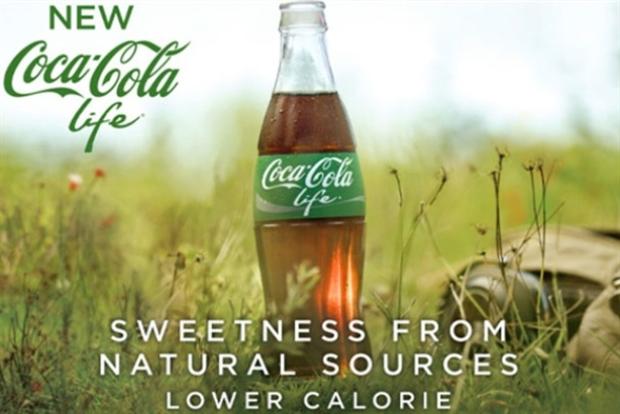
Stevia has been on the agenda for almost a decade, with brands , which is made from the extract of a South American plant. It was approved for use in the EU in 2011 and is about 300 times sweeter than sugar and claims to have virtually no calories.
As the health lobby hots up in its fight against sugar and the government ramps up its public health message, could Stevia create an opportunity for brands by helping to lower calorie content and hit CSR objectives?
People realise they’re not completely immortal and that they do have a sense of responsibility about what they consume
A healthier alternative to sugar
Several brands, from Coca-Cola to Heinz, have been investing in developing and reformulating products with Stevia.
Coke Life is the latest example and perhaps the most significant to date. It has fewer calories than red Coke and the proposition and related imagery is all around natural sweetness, with green branding and the message "sweetness from natural sources".
The launch is indicative of Coke's strategic ambitions in the 'healthier' drinks space. and it has already introduced it to 45 products worldwide.
Coke's marketing, strategy and activation director Bobby Brittain says Coke Life provides an alternative for those looking for healthier options.
It’s for people who "have begun to realise they’re not completely immortal and that they do have a sense of responsibility about what they consume", Brittain told Marketing.
But while its  natural credentials are central to its positioning, Coke has no plans to communicate specifically about Stevia the product.
natural credentials are central to its positioning, Coke has no plans to communicate specifically about Stevia the product.
This month Heinz Ketchup also slashed its sugar content by 50% by introducing Stevia to the recipe. The inclusion of Stevia was promoted with nothing more than in the ingredients list on the back of pack.
PepsiCo’s Trop 50 and 7-Up are other notable brands to have introduced Stevia over the past 18 months.
Artificial sweeteners in decline
As people increasingly take control of their own health, fuelled in part by the trend for the '', so too are consumers increasingly sceptical about artificial ingredients in their food.
Data from IRI reveals that the artificial sweetener market is decline as a result of concerns over sweeteners, with volumes down 3.8% over the past year.
The name Stevia just doesn’t sound natural which may be a problem in the future if brands are to lead their communications with it
At the same time, research by Marketing Sciences reveals 38% of consumers avoid artificial sweeteners like aspartame, and even view them as worse for health than sugar.
The research shows that sweeteners derived from plants and fruits are "perceived to be better, healthier, alternatives than their artificial counterparts". It also shows that consumer attitudes to natural sugar alternatives, like Stevia, are "more positive than their artificial equivalents".
But with little consumer awareness around natural sweeteners, there is some concern that brands could be falling short when it comes to communicating the benefits of natural sweeteners.
Branding challenge
Claire Nuttall, founding partner of branding consultancy Thrive argues a key challenge around Stevia lies in the fact that consumers do not differentiate between artificial and natural sweeteners. She says more education is needed around natural sugars.
"For consumers not necessarily in the know about natural sweeteners, the name ‘Stevia’ takes them to yet another artificial sweetener rather than something more inherently natural," she says. "The sound of the name just doesn’t ring natural which may be a problem in the future if brands are to lead their communications with it."
The drive to create a "proprietary" next generation ingredient name such as Stevia, she adds, "can inadvertently inhibit their widespread adoption and leverage due to the artificial imagery that they can conjure in the minds of end-users".
In turn, Nuttall argues this forces brands to "work even harder on appropriate messaging to counter misperception".
Much more education around natural sugars is critical to Stevia gaining real traction on a mainstream level
"Coke Life has tried to differentiate and convey the natural source via the green branding to mark this exact point of difference. Much more education around natural sugars is critical to Stevia gaining real traction on a mainstream level."
Health has been a key driver for brands for many years. While some trends wane, the spotlight on health is set to only intensify as consumers demand greater transparency from food companies alongside a desire for far greater knowledge and control of their own health.
Already, the market is seeing products where consumers can .
Understanding of new ingredients that make products 'healthier' must overcome the hurdle of consumers' natural cynicism, particularly in the digital age.
Nuttall adds: "There has been so much confusion and concern about even the good natural sugars present in real fruit, there is no wonder consumers are confused and need a bit of help to sift out the real truths."



.jpg)
.jpeg)
